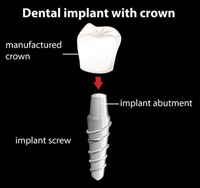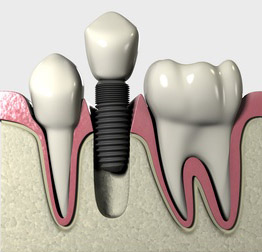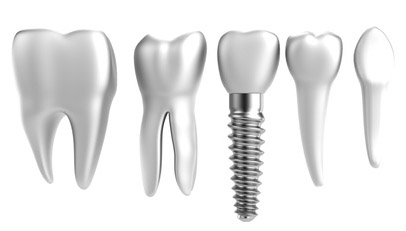Missing permanent teeth can be embarrassing, but it no longer has to deter you from showing off a beautiful smile in Fort Collins! Dental implants are small posts placed beneath the gum to work as the roots of missing teeth. A crown (also called an artificial tooth or prosthesis), is then fitted to match your teeth and mouth structure to improve your smile. An implant can replace one tooth or multiple teeth for a full, healthy smile that looks and feels perfectly natural.
 Implants are changing the way people live. They are designed to provide a foundation for replacement teeth which look, feel and function like natural teeth. A person who has lost teeth regains their ability to eat virtually anything, knowing that teeth appear natural and that facial contours will be preserved. Patients with dental implants can smile with full confidence.
Implants are changing the way people live. They are designed to provide a foundation for replacement teeth which look, feel and function like natural teeth. A person who has lost teeth regains their ability to eat virtually anything, knowing that teeth appear natural and that facial contours will be preserved. Patients with dental implants can smile with full confidence.
You may be a good candidate for dental implants if:
- You are missing one or more tooth.
- Your jaw bone has reached its full growth.
- Your gums and bones are healthy.
- You cannot or will not wear dentures.
- You want to improve your ability to speak and eat.
- You do not have any health conditions that might affect the bone healing process.
What is a Dental Implant?
 Dental implants are prosthetic replacements for missing roots and teeth. They act as the tooth’s root, and a prosthetic crown is placed over the implant to replace the missing tooth. In essence, the implants are metal ‘screws’ in different sizes and shapes for the specific needs of a patient, whether a single or multiple teeth need to be replaced. These are fixed within the bone where the previous tooth or teeth existed. The root portion of the dental implant forms the root where as the exposed portion (above the gum-line) supports the prosthesis. Once placed, a prosthetic crown, bridge and even a denture can be fixed onto the implant to replace the natural crown of the tooth.
Dental implants are prosthetic replacements for missing roots and teeth. They act as the tooth’s root, and a prosthetic crown is placed over the implant to replace the missing tooth. In essence, the implants are metal ‘screws’ in different sizes and shapes for the specific needs of a patient, whether a single or multiple teeth need to be replaced. These are fixed within the bone where the previous tooth or teeth existed. The root portion of the dental implant forms the root where as the exposed portion (above the gum-line) supports the prosthesis. Once placed, a prosthetic crown, bridge and even a denture can be fixed onto the implant to replace the natural crown of the tooth.
Dental implants are made of biologically-friendly metals such as nickel and titanium, of which titanium alloys are now most frequently used. Titanium is a precious metal which has the unique ability to attract bone cells. When a Titanium dental implant is placed, bone cells begin to deposit around the prosthetic tooth and over time, stabilize it firmly in place- this process is known as “osseo-integration”, whereby the dental implant naturally integrates itself within the bone due to the deposition of new bone around it.
How are Dental Implants placed?
 Placing a dental implant is relatively simple, considering the complexity of the dental implants function. Before placement, your Fort Collins dentist will take X-ray to assess the condition of the bone available and the type of implant needed is decided accordingly. If additional bone is needed, your Fort Collins dentist can do a Bone Graph (add additional bone to your jaw area). The placement steps are as follows:
Placing a dental implant is relatively simple, considering the complexity of the dental implants function. Before placement, your Fort Collins dentist will take X-ray to assess the condition of the bone available and the type of implant needed is decided accordingly. If additional bone is needed, your Fort Collins dentist can do a Bone Graph (add additional bone to your jaw area). The placement steps are as follows:
- Local anesthesia is administered to effectively numb the area to be worked on.
- According to the type of dental implant being used, incisions in the gum are made and a hole is drilled with a hand-piece into the bone where there implant is to be placed.
- The dental implant is then inserted into the prepared hole and further tightened into place for better stability.
- The dental implant needs to heal for a period of a few weeks to a few months, depending on the severity of the procedure.
Once the gum and bone have healed, a dental prosthesis such as a crown, bridge and even a removable denture can be placed and fixed over the dental implant.
Why Get Dental Implants?
Dental implants can have real health benefits in addition to the mental well-being and self confidence that goes with having a beautiful smile. Dental implants can prevent bone wear and degeneration that typically occurs when teeth are missing for an extended period of time. Additionally, they can correct your “bite” and jaw alignment, preventing head and mussel aches.
The Surgical Procedure
For most patients, the placement of dental implants involves two surgical procedures. First, implants are placed within your jawbone. For the first three to six months following surgery, the implants are beneath the surface of the gums gradually bonding with the jawbone. At the same time, Front Range Dental Center will be forming new replacement teeth. After the implant has properly bonded to your jawbone, Front Range Dental Center will uncover the implants and attach small titanium posts which will act as the anchor for your artificial teeth. These posts extend through your gums, but when the artificial teeth are placed the posts will not be visible. The entire tooth implant procedure generally takes six to eight months, during which most patients experience minimal disruption to their daily lives.
What Types of Prosthetic Teeth are Available?
 A single prosthetic tooth is used to replace one missing tooth. Each prosthetic tooth attaches to its own implant. A partial prosthesis or bridge can replace two or more teeth. This may require only two or three implants, depending on your specific circumstances. A complete dental prosthesis is available which replaces all the teeth in your upper or lower jaw. The number of implants varies depending upon which type of complete prosthesis is best suited for you. A removable prosthesis is also available which attaches to a bar or ball in socket-type implants. Normally a prosthetic tooth is only removable by a dentist… but as the name suggests a removable prosthetic device can be removed by the patient at any time. Front Range Dental Center performs implant surgery in a hospital-style operating suite located at our Fort Collins facility. Inpatient hospital implant surgery is available for patients who have special anesthetic or medical needs such as extensive bone grafting. Contact us today for all of the available options!
A single prosthetic tooth is used to replace one missing tooth. Each prosthetic tooth attaches to its own implant. A partial prosthesis or bridge can replace two or more teeth. This may require only two or three implants, depending on your specific circumstances. A complete dental prosthesis is available which replaces all the teeth in your upper or lower jaw. The number of implants varies depending upon which type of complete prosthesis is best suited for you. A removable prosthesis is also available which attaches to a bar or ball in socket-type implants. Normally a prosthetic tooth is only removable by a dentist… but as the name suggests a removable prosthetic device can be removed by the patient at any time. Front Range Dental Center performs implant surgery in a hospital-style operating suite located at our Fort Collins facility. Inpatient hospital implant surgery is available for patients who have special anesthetic or medical needs such as extensive bone grafting. Contact us today for all of the available options!
Why Would I Select Dental Implants Over More Traditional Types of Restorations?
There are several reasons: In bridging a gap in your teeth traditional methods often sacrifice good teeth in the vicinity of the gap to anchor the prosthesis. This is completely avoidable with modern implant technologies. For some, removing a denture at night may be inconvenient, not to mention that dentures that slip can be uncomfortable and rather embarrassing. Traditional methods of “filling in gaps” are focused mostly on an aesthetic goal: that being to give one the “appearance” of having normal and natural teeth. Modern implants can actually stop bone degeneration, and for all intents and purposes “are” normal teeth. There is not any additional special care required for implants save maintaining good oral hygiene as you normally would.

Are You a Good Candidate for Implants?
If you are considering implants, your mouth must be examined thoroughly and your medical and dental history reviewed by our specialists. If you mouth is not ideal for implants right away, Front Range Dental Center can make recommendations for ways to improve your readiness, such as bone grafts.
What Types of Anesthesia are Used?
The majority of dental implants and bone graft procedures can be performed at Front Range Dental Center under local anesthesia, with or without general anesthesia.
Do Dental Implants Require Special Care?
Once the implants are in place, they will serve you well for many years if you take care of them and keep your mouth healthy. This means taking the time for good oral hygiene such as brushing and flossing, and keeping regular appointments with your dentist.
Front Range Dental Center is located in Southeast Fort Collins near the intersection of Harmony and Ziegler. Our Fort Collins dentist place dental implants for the following dental communities: Fort Collins, Windsor, Timnath, Wellington, Loveland, Laporte, Ault, and Cheyenne.
